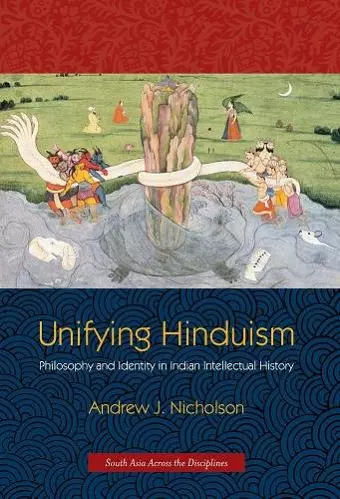Unifying Hinduism
Philosophy and Identity in Indian Intellectual History
Format:Paperback
Publisher:Columbia University Press
Published:11th Feb '14
Currently unavailable, and unfortunately no date known when it will be back

Drawing on the writings of philosophers from late medieval and early modern traditions-including Vijnanabhiksu, Madhava, and Madhusudana Sarasvati-Andrew J. Nicholson shows how influential thinkers portrayed Vedanta philosophy as the ultimate unifier of diverse belief systems. This project paved the way for the work of later Hindu reformers, such as Vivekananda, Radhakrishnan, and Gandhi, whose teachings promoted the notion that all world religions belong to a single spiritual unity. In his study, Nicholson also critiques the way in which Eurocentric concepts-like monism and dualism, idealism and realism, theism and atheism, and orthodoxy and heterodoxy-have come to dominate modern discourses on Indian philosophy.
Some postcolonial theorists argue that the idea of a single system of belief known as "Hinduism" is a creation of nineteenth-century British imperialists. Andrew J. Nicholson introduces another perspective: although a unified Hindu identity is not as ancient as some Hindus claim, it has its roots in innovations within South Asian philosophy from the fourteenth to seventeenth centuries. During this time, thinkers treated the philosophies of Vedanta, Samkhya, and Yoga, along with the worshippers of Visnu, Siva, and Sakti, as belonging to a single system of belief and practice. Instead of seeing such groups as separate and contradictory, they re-envisioned them as separate rivers leading to the ocean of Brahman, the ultimate reality. Drawing on the writings of philosophers from late medieval and early modern traditions, including Vijnanabhiksu, Madhava, and Madhusudana Sarasvati, Nicholson shows how influential thinkers portrayed Vedanta philosophy as the ultimate unifier of diverse belief systems. This project paved the way for the work of later Hindu reformers, such as Vivekananda, Radhakrishnan, and Gandhi, whose teachings promoted the notion that all world religions belong to a single spiritual unity. In his study, Nicholson also critiques the way in which Eurocentric concepts--like monism and dualism, idealism and realism, theism and atheism, and orthodoxy and heterodoxy--have come to dominate modern discourses on Indian philosophy.
In this clear, analytical, well-documented, and well-argued book, Nicholson discusses the conflicts among the various systems of Hindu philosophy and the contributions of the late medieval and early modern thinkers in reconciling the systems and arriving at a unifying picture of Hinduism in Advaita Vedanta. Choice This path-breaking work is very helpful and a must read for scholars of Indian history, Hinduism and south Asian religious traditions. -- Vineeth Mathoor Metapsychology Nicholson has created a tour-de-force that puts India's premodern thinkers in conversation with its postmodern intellectuals. -- Christopher Key Chapple Journal of the American Academy of Religion In this marvelously clear, meticulously researched, and tightly argued book which promises to change the scholarly conversation on Hindu identity, Nicholson sets the record straight regarding the historical emergence of what is today widely known as Hinduism... -- Jeffery D. Long Religious Studies Review Given the enormous scope of its enquiry, the work is relatively concise, very accessible and therefore suitable for the advanced undergraduate or graduate classroom. More than this, it belongs on the bookshelf of anyone interested in the history, and historiography, of Indian philosophy. -- Reid Locklin Sophia Lucid and accessible, Andrew Nicholson's book offers an excellent model for South Asianists seeking to engage with the wider field of religious studies. Journal of the Amer. Academy of Religion Unifying Hinduism is an erudite, informative book. -- Kaif Mahmood South Asian History and Culture
- Winner of Best First Book in the History of Religions, American Academy of Religion 2011
ISBN: 9780231149877
Dimensions: unknown
Weight: unknown
280 pages